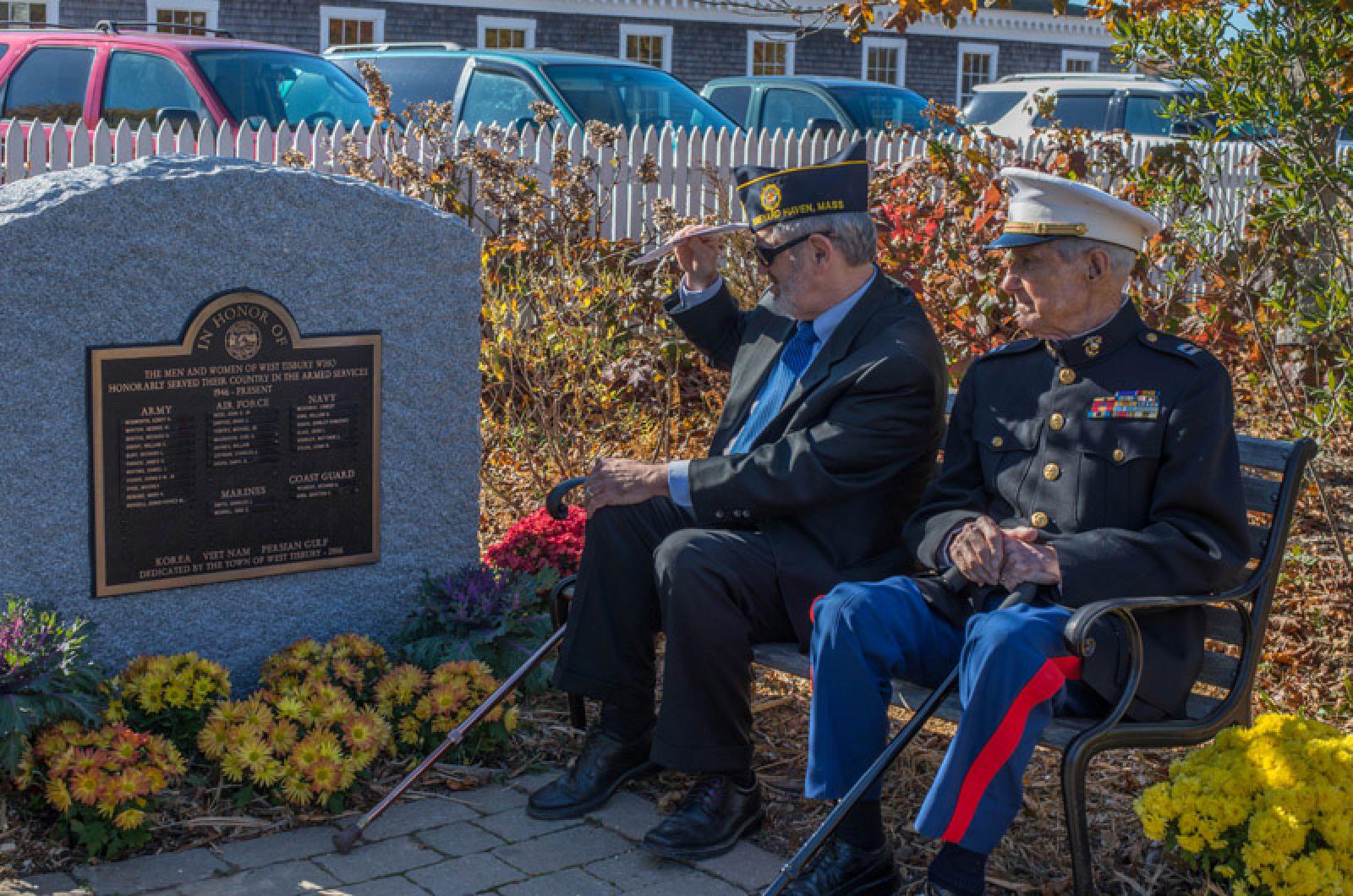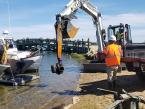Gene DeFelice was 19 and reading the newspaper in his parents’ Dedham living room when a radio news bulletin shattered the Sunday afternoon quiet. The Imperial Japanese Navy had bombed Pearl Harbor and Japan had declared war on the United States.
“I was stunned. We didn’t know anything about the Japanese,” he recalled, sitting in the living room of his Oak Bluffs home last week. “I wanted to enlist the next day, but my father was against it. He wanted me to work in his concrete business and he didn’t want me getting killed. But I was determined to serve my country. After about a week he gave in and said, good luck.”
U.S. Marine Corps Capt. Eugene DeFelice (Ret.), now 97, is one of a handful of World War II veterans who are still around to tell their story, which he shared this week in sharp detail and with self-effacing humor.
Looking dapper in a button-down shirt, pullover sweater and jeans, he showed mementos of a life well lived — photographs of an extended family that filled an entire staircase of a cruise ship, a Purple Heart awarded for wounds he sustained in the Battle of Guadalcanal, and an autographed baseball that he tossed out to officially open the 2012 Martha’s Vineyard Little League season.
He said he chose to enlist in the Marines for practical reasons.
“I had flat feet and I was afraid I wouldn’t get picked,” he said with a chuckle. “Every branch of the service was at the recruiting station, and I saw that flat-footed guys seemed to be getting into the Marines, so I got in that line.”
Nine months after he answered the call of duty, USMC Private DeFelice was
on the front lines with the 1st Marine Division, fighting the Japanese in the Battle of Guadalcanal — a brutal six-month siege that was the first Allied victory in the Pacific theatre.
“I slept in a foxhole for 45 days. When it rained, you slept in water, and you know how it rains in tropics,” he recalled. “We were perched on top of a ridge, defending the airfield. I remember once a Japanese pilot got so close I could look him right in the eye. He never came back after us. I don’t know why. One of our boys probably got him.”
With matter-of-fact detachment, he recalled vivid details of Guadalcanal. Staring into pitch black nights, knowing the enemy could strike at any time. Daily bombardments, air raid sirens, and the sinking feeling when a Japanese airplane left a circle of smoke above his location as a target for aerial assaults. “You talk about scared,” he said.
He recalled a graveyard carved into the jungle that his squad passed when picking up supplies. “Each time we went, there were more and more white crosses,” he said. “You were always reminded that anything could happen to you at any time. We tried to keep our minds occupied, talking about girls and family. It would help you get through the next day, next month, the next hour. You get to know people pretty well when you share a foxhole with them.”
Some soldiers cracked under the constant threat of death.
“Guys shot themselves in the foot, literally, to get out,” he said. “I saw a guy pull a pin from the grenade and just let it drop. I pulled him down and covered him and oh, my you never heard such a loud noise. That’s part of the reason I’m hard of hearing.”
On day 45, Mr. DeFelice was wounded by mortar fire.
“I was out of my foxhole, I’m not sure why, and suddenly I was blown off my feet,” he said. “The first thing I saw was sparks, I put my hands to my face and they were full of blood. I had shrapnel in my head, near my heart, and in my foot. I ended up crawling to the other side of the hill. You never forget what you were trained to do.”
He paused at the memory of a friend who was 10 feet away and killed in the attack. “Sergeant Sam Caputo, nice guy,” he said.
After convalescing in Fiji, Mr. DeFelice rejoined the 1st Marine Division in Australia, where Allied forces were preparing for a Japanese attack that never came. He shipped home after contracting dysentery.
He segued into civilian life, teaching junior high math in Jaffrey, N.H., and starting a family of five. “When I got out of the service it was a funny feeling, I didn’t tell anyone about my military life,” he said. “I did my duty and I was glad it was over.”
But it wasn’t over.
The Marines called again in November 1950, this time to serve in the Korean War as a company commander. “I had three kids, I was getting into my 30s, I was devastated,” he said. “My school principal offered to pull a few strings but I couldn’t do that. If I was called, I had to go.”
After three and a half years, he was offered a promotion to major if he stayed in the Marine Corps. He recalled weighing his decision over a scotch and a cigar, and opting for civilian life, where he soon faced one of his biggest challenges — single fatherhood — after his wife died of cancer.
“That was tough,” he said. “The kids were very young. I had to work every day and it was hard to get help.”
Tragedy struck again when his second wife died of cancer.
But eventually his fortunes improved. He became a school principal in Canton, and he met Connie, now his wife of 53 years. She introduced him to Martha’s Vineyard in the early 1960s.
“Her parents vacationed here since before the war,” he said. “I loved it here right away. It didn’t have the glare and noise of cities. I still jump at loud noises, so the peace and quiet here really appealed to me.”
He became a year-round Island resident in 1984.
“Now I spend the winter in Florida, but Oak Bluffs is home,” he said.
His favorite Vineyard tradition is the Edgartown Fourth of July parade, which he participated in for many years wearing the dress uniform from the Korean War. He once walked the parade with his granddaughter and great-granddaughter.
“I love that parade. It’s like a Norman Rockwell painting come to life,” he said. “It’s a wonderful way to show my love of my country. The veterans all know each other from the American Legions and the VFW and we always had a lot of fun. We looked pretty good, too.”







Comments (10)
Comments
Comment policy »